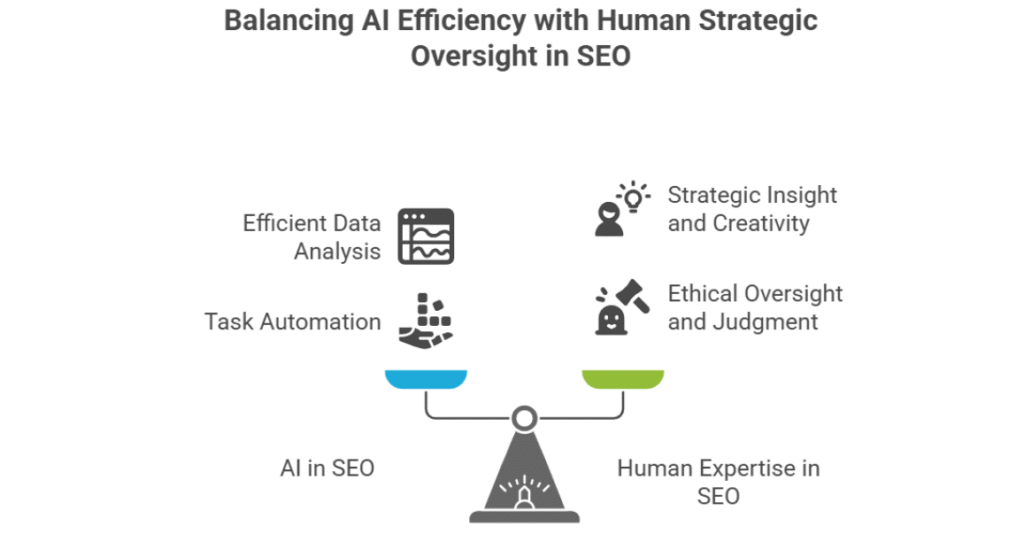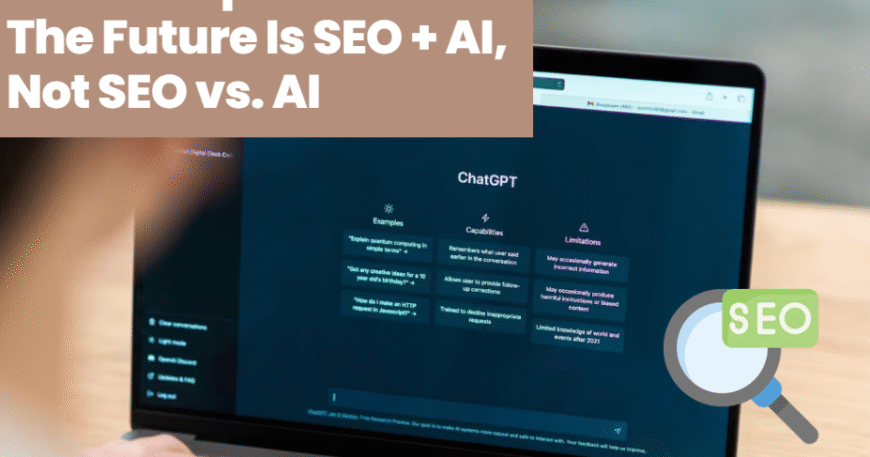
Table of Contents
- Introduction
- The Evolution of SEO in the AI Era
- Misconception: AI is Replacing SEO
- Reality: AI is Enhancing SEO
- Why SEO is Still Crucial (and Even More So Today)
- How to Use AI with SEO, Not Against It
- Examples of AI and SEO Working Together
- Final Thoughts
- FAQs
Introduction
With the rise of artificial intelligence, there’s been widespread speculation about the future of traditional digital marketing practices. One question in particular has caught everyone’s attention: Has AI replaced SEO? It’s a reasonable question—after all, AI tools can now write blogs, automate keyword research, answer user queries directly through search engine features, and even mimic the voice of brands. However, despite this technological leap, the notion that AI has made SEO obsolete is both misleading and inaccurate.
In reality, AI has not replaced SEO. Instead, it has transformed how SEO is practiced. Far from making it irrelevant, AI has made search engine optimization more complex, more dynamic, and more essential for businesses that want to remain visible and competitive in a digital-first world.
Understanding the Misconception: Why People Think AI Has Replaced SEO
The idea that AI has taken over SEO stems from surface-level observations. Platforms like ChatGPT, Bing Copilot, Google’s AI Overviews (formerly SGE), and voice assistants now answer questions directly, often without requiring users to click on any links. This shift in behavior has given the impression that search engines no longer need web pages to fulfill a query.
Moreover, AI tools have rapidly become proficient at content generation. With just a few prompts, marketers can produce blogs, social posts, product descriptions, and even code. Many are tempted to believe that because AI can generate content and answer questions, the traditional need for optimization, keyword planning, or backlinks has diminished.
But this assumption overlooks a critical reality: the content AI tools rely on still comes from human-curated, optimized web pages. Even when AI answers a question, it is synthesizing and repurposing content that was originally created, optimized, and published by human experts.
The Relationship Between AI and SEO: Not Replacements, but Collaborators
Rather than functioning as opposing forces, AI and SEO are increasingly interwoven. AI has not supplanted SEO; it has enhanced it. Artificial intelligence offers powerful capabilities that can make SEO efforts more efficient and more precise—but only when guided by human expertise.
AI excels at analyzing large volumes of data, identifying content patterns, detecting user intent shifts, and automating repetitive tasks like technical audits or on-page analysis. But it does not inherently understand a brand’s voice, the subtleties of industry-specific language, or the strategic priorities behind content marketing efforts. This is where SEO professionals continue to play an indispensable role.
Today, successful SEO requires a collaborative approach—one where human marketers leverage AI tools to inform their strategies, refine their content, and scale their efforts, all while maintaining strategic oversight.
Why SEO is More Important Than Ever Before
AI Still Relies on Optimized Content
Even the most sophisticated AI algorithms depend on optimized content to understand and serve relevant information. When a user asks a question through voice search or Google’s AI Overviews, the system pulls its answers from trusted, indexed sources. If your content is not optimized for search engines, it won’t be selected by these systems, regardless of how valuable it may be.
Search engines use AI to identify which pages best match user intent. But those pages must still adhere to best SEO practices—such as clean site structure, semantic keyword use, fast loading speeds, and mobile responsiveness—to rank and appear in AI-generated answers.
AI Enhances Search—It Doesn’t Replace It
The search landscape is evolving. Users now interact with search engines in more conversational and fragmented ways. AI has changed how questions are asked and how answers are delivered. However, none of this negates the need for SEO. On the contrary, these changes make it even more critical to have a well-optimized digital presence.
SEO today is about optimizing not just for static queries, but for complex, intent-driven experiences. Search engines are prioritizing relevance, authority, and helpfulness—criteria that require thoughtful content creation, technical excellence, and long-term strategy. AI simply helps us understand these requirements better and respond to them more effectively.
The Modern SEO Landscape: Driven by Experience, Authority, and Trust
Modern SEO is about much more than keywords. Google’s Helpful Content Update, E-E-A-T (Experience, Expertise, Authoritativeness, and Trustworthiness), and Core Web Vitals emphasize delivering genuine value to users. AI does not invalidate these frameworks—it operates within them.
Creating content that ranks today means being genuinely useful, providing expert-level depth, and ensuring your website performs well across devices and page speeds. AI can assist in data gathering, topic ideation, and optimization, but it cannot fabricate lived experience or establish a track record of trust.
If anything, AI has raised the bar. Content that is shallow, generic, or duplicated will be filtered out—not only by search engines, but by users who are increasingly discerning. Human-led SEO, backed by AI assistance, ensures that content stands up to these expectations.

The Role of AI in SEO Strategy
AI offers several distinct advantages when used within a structured SEO framework:
- Smarter Keyword Research: AI can identify keyword clusters, semantic relationships, and long-tail variations that might not be obvious through traditional tools.
- Content Planning and Optimization: AI tools can analyze top-ranking pages and suggest outlines or keyword placement strategies to improve content relevance.
- Technical Auditing: AI-based crawlers can flag broken links, slow-loading pages, crawl errors, and structural inefficiencies more efficiently.
- Search Intent Matching: Natural language processing models can better understand different types of queries—informational, navigational, transactional—and help you tailor content accordingly.
- Trend Forecasting: AI can detect shifts in search trends earlier, enabling you to create timely and relevant content before competitors catch up.
However, none of these benefits are automatic. They must be guided by human judgment, editorial insight, and strategic direction to align with business goals.
Why SEO is Still Crucial (and Even More So Today)
Here’s why AI has made SEO even more critical:
AI Needs Optimized Content to Perform Well
Even AI tools rely on well-structured, optimized content. Google’s AI-based features pull from high-authority, well-optimized sources. If your site isn’t optimized, AI won’t consider it.
Search Engines Are Still Gateways to Visibility
Organic search still drives over 50% of web traffic for most industries. Whether AI is summarizing or serving answers, it still sources from indexed content—your SEO efforts help you be that source.
AI-Powered Search Prioritizes User Experience
SEO is no longer just about keywords; it’s about experience, authority, trust, and relevance (E-E-A-T). That aligns directly with what AI-powered search wants to deliver.
AI Can’t Replace Human Insight or Strategy
AI tools are brilliant at processing data and automating tasks. But they lack contextual understanding, brand voice, ethical nuance, and industry-specific knowledge. Human strategy is irreplaceable.
SEO in the Age of Generative Search and AI Overviews
With Google introducing AI-generated summaries at the top of search results, many fear that website traffic will decline. While it’s true that some zero-click searches may increase, it’s also true that featured content in these summaries is often cited with links.
This presents a new SEO opportunity. If your content is authoritative, structured with schema markup, and optimized for clarity, it can be featured within these AI summaries—giving you premium visibility and positioning your site as a trusted source.
SEO in this context is not just about ranking. It’s about becoming a cited source of truth. That shift reemphasizes the need for strong, factual, and original content.
Final Thoughts: The Future Is SEO + AI, Not SEO vs. AI
The digital marketing world is not facing an either-or scenario. We are entering an era where SEO and AI will continue to grow together. SEO professionals who embrace AI as a collaborative tool will outperform those who ignore or fear it.
Artificial intelligence is helping us understand user behavior at scale, identify content gaps faster, and automate time-consuming tasks. But the strategic decisions, emotional intelligence, brand voice, and ethical considerations required in SEO cannot be automated.
Ultimately, SEO is not going anywhere. It’s simply evolving—and those who evolve with it, guided by AI and informed by human creativity, will lead the future of digital discovery.
Frequently Asked Questions
Has AI made SEO obsolete?
No. AI has changed how SEO is practiced but has not rendered it obsolete. In fact, it has made SEO more strategic and essential to visibility in a crowded digital space.
Can AI tools fully manage my SEO strategy?
AI tools can support your SEO efforts by handling research, automation, and basic content generation. However, a successful SEO strategy still requires human direction, creativity, and ethical oversight.
Will Google’s AI Overviews reduce organic traffic?
AI Overviews may reduce clicks for simple queries, but they also create new visibility opportunities for high-quality content. Being featured in AI results often depends on strong SEO fundamentals.
What should I focus on in SEO going forward?
Focus on content quality, topical authority, site performance, structured data, and user intent. Integrating AI tools into your process can help scale and refine these efforts, but human oversight is non-negotiable.




